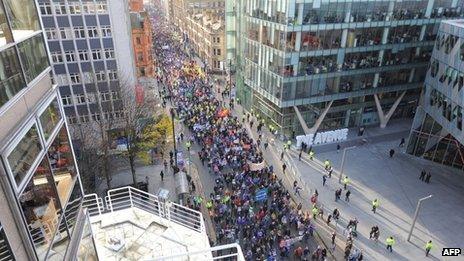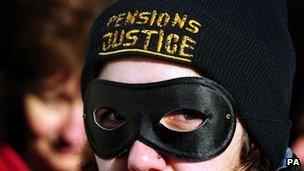Public sector strike rallies held across UK
- Published
- comments

Unions accuse the government of failing to participate in proper negotiations in recent weeks, a claim rejected by ministers
Tens of thousands of people joined rallies around the UK as a public sector strike over pensions disrupted schools, hospitals and other services.
About two-thirds of state schools shut, and thousands of hospital operations were postponed, as unions estimated up to two million people went on strike.
The TUC called it "the biggest strike in a generation". The prime minister described it as "a damp squib".
Unions oppose plans to make members pay more and work longer to earn pensions.
The strike had the following effects:
Department for Education figures suggest 62% of England's 21,476 state schools were closed, with another 14% partly shut
In Scotland just 33 of the 2,700 state schools were open, according to local authority body Cosla. In Wales, more than 1,500 out of 1,776 schools shut. In Northern Ireland, about two-thirds of the 1,200 schools closed
On Wednesday evening, London Ambulance Service formally requested help from police to answer 999 calls, and has urged people only to call if life is at risk; South East Coast Ambulance Service has said it is only responding to "life-threatening emergencies"
Discussions were held between the police and the Independent Police Complaints Commission about the increased risk that someone could die while being transported in a police van or being treated by police - this would still be classified as a "death in custody" and the IPCC would still need to be notified
NHS managers said a little under 7,000 of approximately 30,000 routine operations were cancelled or postponed across the UK as well as tens of thousands of appointments
BBC News Channel's chief political correspondent Norman Smith tweeted:, external "(Health Secretary) Andrew Lansley says patients who have ops cancelled today will still be seen within 18-week limit."
Plane arrivals and take-offs at Britain's two biggest airports - Heathrow and Gatwick - were said to be largely unaffected with only a few cancellations of in-bound transatlantic flights to Heathrow
The Local Government Association said about a third of England and Wales council staff were not in work, equating to about 670,000 out of 2.1 million. About 250,000 public sector workers went on strike in Scotland while 170,000 workers in Wales took action
Just 14 job centres out of more than 900 across the UK closed, according to the Cabinet Office
Twenty-one people were arrested after an office in London's West End was targeted at about 15:50 GMT on Wednesday by a group of protesters believed to be from the Occupy London anti-capitalist campaign group
Scotland Yard said that, by early evening on the protest day, it had made 75 arrests across the capital for a variety of offences
Video from around the UK
As hundreds of rallies were held in cities and towns across the UK, the TUC estimated that 30,000 protesters had turned out in Birmingham and some 25,000 in London.
The government disputed that two million people had joined the action, with David Cameron saying "it looks like something of a damp squib" at Prime Minister's Questions.
"Our rigorous contingency planning has been working well," Cabinet Minister Francis Maude said later in the day.
"Throughout the day it has limited the impact of the strikes significantly and as a result the majority of key public services have remained open."
TUC general secretary Brendan Barber accused the government of "rhetoric today ... as predictable as it has been shallow".
"The biggest strike in a generation cannot be dismissed as a damp squib," he said.
"Uniting so many people in such strong opposition to their pension plans should give the government pause for thought.
"They now need to give the negotiations real content. Unions wants to achieve a fair settlement, but it takes two to reach a deal."
In the Commons, Mr Cameron said he thought the government had made a "very reasonable, very fair offer to public sector workers".
"I don't want to see any strikes, I don't want to see schools closed, I don't want to see problems at our borders, but this government has to make responsible decisions," he said.
But union leaders accused the government of failing to engage in proper negotiations in recent weeks.
Unison general secretary Dave Prentis said that the last time unions met Treasury ministers was 2 November, adding that "this idea that negotiations are continuing is just not true".
Mr Maude disputed that, saying formal discussions with the civil service unions took place on Tuesday and that talks would take place with teaching unions on Thursday and with health unions on Friday.
A TUC spokesperson responded: "There have been informal exchanges but nothing that could be described as negotiations at the national level."
Chris Keates, head of the teachers' union NASUWT, said: "We're in this position today simply because the government had not entered into genuine negotiations at an earlier stage."
Labour leader Ed Miliband said he had "huge sympathy" for people whose lives were disrupted by the strike.
But he said he was "not going to condemn the dinner ladies, nurses, teachers who have made the decision to go on strike because they feel they have been put in an impossible position by a government that has refused to negotiate properly".
'Huge damage'
Liberal Democrat Party president Tim Farron told the BBC News Channel the unions were wrong to strike because workers on low to middle incomes would get a "better, or certainly no worse" pension when they retire than is currently the case.
The prime minister's spokesman said a small number of Downing Street staff had gone on strike, while others had been affected by school closures and some staff from the Downing Street policy unit were helping out at the borders.
Mr Cameron's press secretary Gabby Bertin worked on passport control at Heathrow airport, along with a number of No 10 staff, Downing Street confirmed.

More than 1,000 demonstrations were expected across the UK
Public and Commercial Services (PCS) union members who work for the UK Border Agency went on strike but airport sources suggested to the BBC that immigration controls were at two thirds of normal staffing levels - more than the 30-50% predicted previously.
The Immigration Services Union said 80% to 90% of staff went on strike, with 22 out of 23 workers at Calais port not showing up for work and, as far as they are aware, none of their members working at Heathrow.
Simon Walker, of the Institute of Directors, told the BBC News Channel the strike had done "significant damage" to the economy.
"If you're damaging the productive capacity of this country you're really doing huge damage to the fabric of the economy and that will last a long time and impact on all of us," he said.
 Strikers speak out across UK
Strikers speak out across UK
 Teacher: Too many pension reforms
Teacher: Too many pension reforms
 'No delays at Heathrow'
'No delays at Heathrow'
 What impact has strike had?
What impact has strike had?
 Maude 'astonished' at union claims
Maude 'astonished' at union claims
 'This is about low paid women'
'This is about low paid women'
 Ambulance calls under pressure
Ambulance calls under pressure
 Cameron and Miliband clash
Cameron and Miliband clash